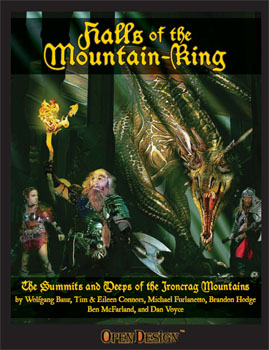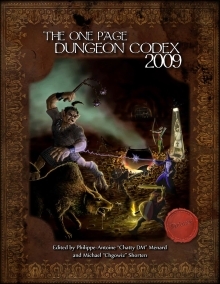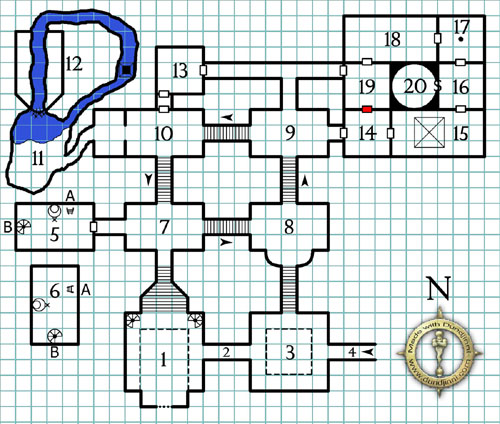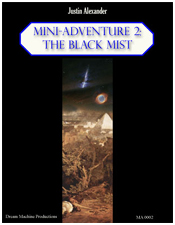Go to Part 1
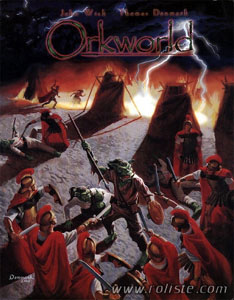 The Bashfanal is one of the lesser cycles of orkish mythology. The story told above forms its core, and is known variously as “Fanal and His Brothers”, “The Fall of the House of Thrush”, or “The Second Birth of Fanal” (among others). The form and content of the cycle varies widely depending upon which orkish tribes are telling the story (based largely on where the stories began, whether they’ve survived, and how they’ve changed over time).
The Bashfanal is one of the lesser cycles of orkish mythology. The story told above forms its core, and is known variously as “Fanal and His Brothers”, “The Fall of the House of Thrush”, or “The Second Birth of Fanal” (among others). The form and content of the cycle varies widely depending upon which orkish tribes are telling the story (based largely on where the stories began, whether they’ve survived, and how they’ve changed over time).
The telling of a tale from the Bashfanal may provide no more than a little local color to a GM’s campaign, but it is also possible to weave the tale of Fanal into the fabric of the campaign itself. The adventure seeds below assume that there is a fundamental truth to the story of Fanal as told above. As a result they will most likely work best in an epic Orkworld campaign, but are also easily adaptable to a realistic or cliché game.
Several of these seeds are incompatible with one another, but many of them can easily work in combination – leading to the possible use of Fanal’s story as a continuing theme and element of the campaign.
GMs are also encouraged to remember that, like the Orkworld game itself, the tale of Fanal – and its off-shoots – can easily be adapted to a variety of other fantasy settings.
THE SWORD OF FANAL
One version of the Bashfanal tells of Fanal’s last journey, which took him deep into the cold lands of the north. There he faced Galathvarl – a foul abomination spawned in the sorcerous joining of elven and orkish spirits.
Abandoned at birth by his elven creator, Galathvarl taught himself the ways of his sorcerous forefathers. Wishing to end the torment of his divided soul, Galathvarl had conceived a plan to summon forth Keethdowmga, the Great Mother of the Orks, and slay her — believing that in the moment of her death his own orkish spirit would be vanquished.
Whether his plan would have succeeded shall never be known, for Fanal was able to prevent the ritual’s completion – but only at the cost of his own life.
Galathvarl, for his own part, survived the mighty explosion which rocked the northern mountains – but only due to the perseverance of his elvish spirit. Through the many years which have passed, he has slowly nursed himself back to health from his nearly destroyed state. Now he is ready to repeat the ritual… but this time with the aid of Bashayla.
(GMs looking for a particularly simple way of incorporating the story of Fanal into their campaigns as a bit of local color could simply strip this idea down to its essential core: The PCs find Bashayla. Imbue it with whatever magical powers you feel appropriate to your campaign and characters.)
THE GRAY SPEAR
Upon the battlefield the Gray Spear was sundered in twain. Legend has it that while the orks retained one half of the spear the other half was stolen away by the elves. Fanal summoned a young ork by the name of Ghurdal to carry his half of the Gray Spear to a place of safety. When the Battle of the Triad came to an end, a search was called to find the other half of the legendary spear – but it had disappeared into the blackened lands of the elves.
Ghurdal carried his half of the Gray Spear to a secret complex of caves, far up in the mountains. He lives there to this day – his life sustained by the life preserving magics of the cave complex – guarding the Gray Spear against all trespassers.
Unfortunately, over the years between then and now, the magical energies unleashed by the sundering of the Gray Spear have slowly been building up in its broken halves. Recently these energies have reached a critical mass, and the mystical connection between the two halves is warping all of reality between the two.
The PCs must track down the two hidden halves of the Spear – one protected still by Ghurdal; the other hidden away inside an elven citadel – and reunite them, or the world of Ghurtha itself may be torn apart.
(A possible complication for risk-taking GMs: Galathvarl could, again, rear his abominable head in this scenario – seeking the two halves of the Gray Spear in order to power his foul experiments.)
THE TRIAD’S REVENGE
Not all of the orks who fought in the Battle of the Triad perished on the battlefield. Those who survived, however, carried with them a lasting curse – and this curse was carried down from one generation to the next… right to one of the PCs. It is said that the only way to rid an ork plagued by the curse is to wash in the blood of Fanal.
THE SPIRIT OF ATHVALSAI
Death has never been an effective barrier when there’s a good story to be told – thus it has been, thus it shall always be. When Athvalsai’s body fell during the Third Battle of the Triad, his spirit was not similarly broken. To this day it haunts the field on which it fell. Recently, however, the spirit seems to have disappeared. Although orks have cautiously moved back into the area, their actions may be more than premature – in truth, Athvalsai is gathering strength (or has gathered strength) in order to possess another host body.
THE RETURN OF FANAL: A TIME OF TROUBLE
When his adventuring days were done it is said that Fanal did not die, but instead crossed bodily into the world of the Otherside. One version of the tale tells how Fanal, with the help of Pugg, tricked Gorlam into letting him pass into the Otherside. Another claims that Fanal had to sacrifice the blade of Bashayla to Gorlam in order to pass (and that the sword resides until this day within the Great Toad’s belly).
Whatever the case, there he waits: Living among the gods and the spirits of the dead, awaiting the day of his Return – when he will save his people from a dire crisis which will threaten all their lives.
(Using this scenario, the return of Fanal should almost certainly be treated as the culmination of a grand campaign: The orkish people are threatened with destruction, and only by securing the return of Fanal will the PCs be able to save their race. It should almost go without saying that such a story could easily include the defeat of Gorlam himself. )
THE RETURN OF FANAL: A SPIRIT TRAPPED IN CRYSTAL
Not all versions of the Bashfanal claim that Fanal passed to the Otherside. Some say that Fanal fell in an act of sacrifice (the stories vary as to whether this was to great purpose or merely a small, but characteristic, act of selflessness). Of these stories, some fraction also claim that Fanal’s spirit was unwilling – or unable – to journey to the Otherside, and instead remained here on the Wakingside.
In this scenario, the PCs discover the dark truth of these latter tales: At the moment of Fanal’s death, his spirit was trapped in a blood red crystal through the foul sorceries of an evil elf. For centuries the orkish hero was forced to serve this dark master, until finally the elven lord was killed during a political machination. The crystal containing Fanal’s spirit was lost, but now it has been recovered by the PCs. In order to free Fanal from his prison, however, the PCs discover that they must secure an artifact created by the dead elven sorceror – and the only way to accomplish that is to venture into the Elven Desert and locate his forgotten citadel.
THE RETURN OF FANAL: A HAUNTED SPIRIT
Recently, forced onto ever-worsening land by the encroachment of man, a lesser household has set up their Winter Home in poor, barren territory which has never been inhabited by any humanoid race in memory. Unfortunately, this new Winter Home seems to be plagued by various forms of poltergeist and spirit activity. Upon some investigation the PCs discover that the troubles are being caused, as a way of attracting attention, by the wandering spirit of Fanal.
It turns out that Fanal was killed in battle before he could return the sword Bashayla to the cave from whence it came – as a result, his spirit has been forced to wander the world. This, of course, is where the PCs enter the picture: They must obtain the sword and return it to its rightful place.
THE BATTLE OF THE TRIAD
In a radically different vein, you might consider of the possibility of setting the campaign in the same time period as the stories of Fanal. In this scenario, the PCs are contemporaries of the Swordbearer and are present during the Battle of the Triad. A number of possible adventure structures suggest themselves within this broad outline:
1. One of the PCs might take Fanal’s place in “history”, living out the events described above and triggering an entire campaign based upon the structure of the Bashfanal.
2. Perhaps the PCs accompany Fanal during the Sword Quest to find Bashayla – going down in history as Fanal’s loyal companions and closest friends. This, too, could be used as a triggering event which allows them to accompany Fanal throughout the rest of his adventures.
3. Another option is to simply use the Battle of the Triad as a backdrop to some other story: The PCs become involved with the battle through events totally unconnected to Fanal (although the deeper events surrounding the battle may have an impact at some later point in the campaign – for example if they encounter Fanal during his wanderings (see below)).
FANAL THE WANDERER
Another possibility in a campaign set contemporary to Fanal’s life is to have the PCs encounter the hero during the later part of his career – when he was a wandering hero among the orkish people. This encounter can be handled in a number of ways.
